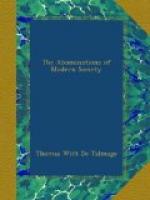Gambling is the risking of something more or less valuable in the hope of winning more than you hazard. The instruments of gaming may differ, but the principle is the same. The shuffling and dealing of cards, however full of temptation, is not gambling, unless stakes are put up; while, on the other hand, gambling may be carried on without cards, or dice, or billiards, or a ten-pin alley. The man who bets on horses, on elections, on battles—the man who deals in “fancy” stocks, or conducts a business which extra hazards capital, or goes into transactions without foundation, but dependent upon what men call “luck,” is a gambler.
It is estimated that one-fourth of the business in London is done dishonestly. Whatever you expect to get from your neighbor without offering an equivalent in money or time or skill, is either the product of theft or gaming. Lottery tickets and lottery policies come into the same category. Fairs for the founding of hospitals, schools and churches, conducted on the raffling system, come under the same denomination. Do not, therefore, associate gambling necessarily with any instrument, or game, or time, or place, or think the principle depends upon whether you play for a glass of wine, or one hundred shares in Camden and Amboy. Whether you employ faro or billiards, rondo and keno, cards, or bagatelle, the very idea of the thing is dishonest; for it professes to bestow upon you a good for which you give no equivalent.
This crime is no newborn sprite, but a haggard transgression that comes staggering down under a mantle of curses through many centuries. All nations, barbarous and civilized, have been addicted to it. Before 1838, the French government received revenue from gaming houses. In 1567, England, for the improvement of her harbors, instituted a lottery, to be held at the front door of St. Paul’s Cathedral. Four hundred thousand tickets were sold, at ten shillings each. The British Museum and Westminster Bridge were partially built by similar procedures. The ancient Germans would sometimes put up themselves and families as prizes, and suffer themselves to be bound, though stronger than the persons who won them.
But now the laws of the whole civilized world denounce the system. Enactments have been passed, but only partially enforced. The men interested in gaming houses wield such influence, by their numbers and affluence, that the judge, the jury, and the police officer must be bold indeed who would array themselves against these infamous establishments. Within ten years the House of Commons of England has adjourned on “Derby Day” to go out to bet on the races; and in the best circles of society in this country to-day are many hundreds of professedly respectable men who are acknowledged gamblers.
Hundreds of thousands of dollars in this land are every day being won and lost through sheer gambling. Says a traveller through the West—“I have travelled a thousand miles at a time upon the Western waters and seen gambling at every waking moment from the commencement to the termination of the journey.” The South-west of this country reeks with this abomination. In New Orleans every third or fourth house in many of the streets is a gaming place, and it may be truthfully averred that each and all of our cities are cursed with this evil.




